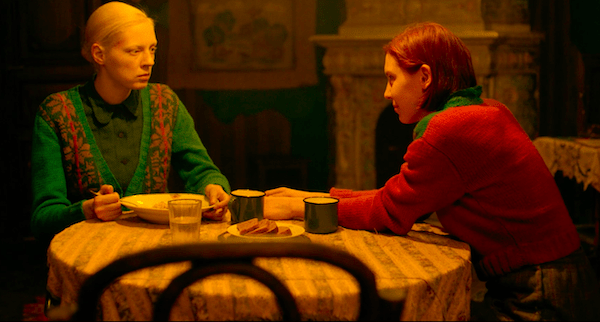Film Review: “Beanpole” — Hardship Rendered in Searing Color
By Peg Aloi
Beanpole is infused with a profoundly tender intimacy, interspersed with stark portrayals of pain, cruelty, and sacrifice.
Beanpole, directed by Kantemir Balagov. Screening at Kendall Square Cinema.

A scene from Beanpole featuring Iya (Viktoria Miroshnichenko) and Masha (Vasilia Pereylgina).
It begins in darkness and near silence. Over the opening credits, faint clicking sounds arise, which are then layered with quiet breathy sighs. Next we see the face of Iya, aka Beanpole, a tall, slender pale blonde Russian woman, standing stock-still and staring blankly ahead. As she comes out of her brief episode (of what looks like a mild form of epilepsy), we hear a muffled voice say “she’s frozen again.” After that, sound levels return to normal and a woman nearby asks if she’s “back with us now.” We’ve just experienced one of Iya’s episodes from the inside out, seeing and hearing the world as it fades briefly into an inaccessible foggy landscape where she is helplessly, if only briefly, trapped.
It’s the autumn of 1945, the war is over, and Iya (Viktoria Miroshnichenko) is a nurse in a hospital facility for wounded soldiers in Leningrad. She cares for a small boy at home; she brings him to the hospital when her neighbor can’t watch him. The patients play games with young Pashka, and the kindly administrator Dr. Nikolay (Andrey Bykov) gives her extra food rations for the boy when they become available — if wounded or ill soldiers die. The city is in ruins and the hospital a place where suffering is acknowledged but not pitied: there is too much hardship everywhere. Iya is a caring and efficient nurse despite her difficulties. She finds moments of joy with Pashka, but a tragic incident (in one of the film’s most devastatingly artful scenes) obliterates her only emotional respite.
Winner of the Prix un certain regard at the 2019 Cannes Film Festival, Beanpole is the second feature by 28-year-old Russian filmmaker Kantemir Balagov. The film is based, at least in part, on an oral history of Soviet women’s wartime experiences (The Unwomanly Face of War by Svetlana Alexievich, published in 1985). Beanpole is stunningly sure-handed filmmaking, from its strikingly beautiful color scheme and intense moods to its masterful performances. The story’s center is the relationship between Iya and Masha (Vasilia Pereylgina), who were friends when they fought on the front lines. The backstory of their relationship unfolds in an unorthodox way: there are no flashbacks, but neither are there any clumsy expository conversations.
Interestingly, it is the often garish but alluring color dichotomy — bright green versus magenta — that establishes the bond between Iya and Masha. Iya wears green constantly, even if it can only be found in a row of stitches on a beige knitted hat. Masha’s hair is magenta, an unrealistic color for a Russian woman circa 1945, yet it serves to deepen the film’s symbolic visual palette. Even the chalky rubble of Leningrad is accented with small touches of green or magenta, as are random bits of clothing and shots of buildings whose windows flash gaudily at night. This color theme is deployed brashly but consistently. I found myself observing it closely, witnessing an expression of the aching search for beauty and vitality in the crumbling postwar setting.
Iya was ordered home from military duty because a concussion, responsible for her current fugue states, left her unable to serve. Masha returns home and moves into Iya’s small flat. She gets a job working alongside Iya at the hospital. Dealing with Pashka’s loss is enormously painful for Masha, who, it turns out, was Pashka’s mother, having given birth while on the front lines. But eventually Masha takes the loss in stride, and encourages the shy and awkward Iya to socialize outside the hospital.
The women go out one night and encounter two drunken louts, one urging the other to lose his virginity to one of the “military girls,” who have reputations for being promiscuous. Masha willingly deflowers Sasha, who, like Iya, is awkward and shy. But Iya returns from her potential assignation with the other young man having resisted his advances, injuring him in the process. Indeed, despite her kindness and affection for some of her patients, Iya seems uninterested in forming any kind of a meaningful bond with a man. As they continue to weather loss and heartbreak, the two women’s relationship grows tighter, but it is also tested by outbursts of grief and anger, or emotions of loss too fragile to give voice to.
Bagalov’s directorial vision and voice are bold and compelling. Beanpole is infused with a profoundly tender intimacy, interspersed with stark portrayals of pain, cruelty, and sacrifice. And yet these hard-to-watch moments never feel lurid or gratuitous. Indeed, this a deeply humane story, an exploration of our endless capacity for desire and hope even as we bear unspeakable, seemingly endless, tragedy. The film’s colorful visual language offers refreshing glimpses of art amidst ruin, a sign that beauty can emerge from unexpected places to soothe souls in torment.
Peg Aloi is a former film critic for the Boston Phoenix and member of the Boston Society of Film Critics. She taught film studies in Boston for over a decade. She writes on film, TV, and culture for web publications like Vice, Polygon, Bustle, Mic, Orlando Weekly, Crooked Marquee, and Bloody Disgusting. Her blog “The Witching Hour” can be found at themediawitch.com.
